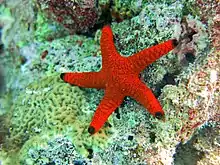| Goniasteridae Temporal range: | |
|---|---|
 | |
| Pentagonaster duebeni | |
| Scientific classification | |
| Domain: | Eukaryota |
| Kingdom: | Animalia |
| Phylum: | Echinodermata |
| Class: | Asteroidea |
| Order: | Valvatida |
| Family: | Goniasteridae Forbes, 1841 |
| Genera | |
|
See text | |
Goniasteridae (the biscuit stars) constitute the largest family of sea stars, included in the order Valvatida. They are mostly deep-dwelling species, but the family also include several colorful shallow tropical species.
Description
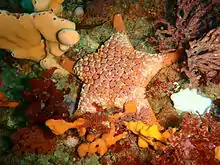
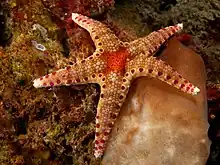
Goniasteridae are usually middle-sized sea stars with a characteristic double range of marginal plates bordering the disk and arms. Most of them have five arms, often short and triangular, around a broad central disc; many species are pentagonal or subpentagonal, covered densely with granular, seed-like protuberances, hence the name of the family "seed-star" (gonium+aster). The aboral face is often covered with tiny spines looking like paxillae. Pedicellariae are often valvate, and the gonads are located at the interradius.[1]
Main identification keys for this group include the presence of paxillae, granules, teeth, spines, or the shape and dimensions of marginal plate.[2]
Location and habitat
They occur predominantly on deep-water continental shelf habitats (but a part of them inhabit shallow waters)[3] in all the world's oceans, being the most diverse in the Indo-Pacific region.[4]
List of genera
About 260 extant species within 70 genera are currently known, which make this family the most diverse of all the sea stars,[5] even if half of the genera are monospecific. Species belonging to the Ferdininae subfamily have been imported from Ophidiasteridae thanks to a large revision of these two families in 2017[6]
According to World Register of Marine Species, this family includes the following genera:[7]
- genus Anthenoides Perrier, 1881 -- 10 species
- genus Apollonaster Halpern, 1970 -- 2 species
- genus Astroceramus Fisher, 1906 -- 9 species
- genus Astropatricia McKnight, 2006 -- 1 species
- genus Astrothauma Fisher, 1913 -- 1 species
- genus Atelorias Fisher, 1911 -- 1 species
- genus Bathyceramaster Mah, 2016 -- 2 species
- genus Calliaster Gray, 1840 -- 12 species
- genus Calliderma Gray, 1847 -- 1 species
- genus Ceramaster Verrill, 1899 -- 18 species
- genus Chitonaster Sladen, 1889 -- 4 species
- genus Circeaster Koehler, 1909 -- 9 species
- genus Cladaster Verrill, 1899 -- 4 species
- genus Diplasiaster Halpern, 1970 -- 1 species
- genus Enigmaster McKnight & H.E.S. Clark, 1996 -- 1 species
- genus Eratosaster Mah, 2011 -- 1 species
- subfamily Ferdininae Mah 2017
- genus Bathyferdina Mah 2017 -- 1 species
- genus Eosaster Mah, 2017 -- 1 species
- genus Ferdina Gray, 1840 -- 3 species
- genus Kanakaster Mah, 2017 -- 6 species
- genus Neoferdina Livingstone, 1931 -- 12 species
- genus Paraferdina James, 1973 -- 3 species
- genus Floriaster Downey, 1980 -- 1 species
- genus Fromia Gray, 1840 -- 16 species
- genus Gigantaster Döderlein, 1924 -- 1 species
- genus Glyphodiscus Fisher, 1917 -- 3 species
- genus Goniaster L. Agassiz, 1836 -- 1 species
- subfamily Hippasterinae
- genus Evoplosoma Fisher, 1906 -- 8 species
- genus Gilbertaster Fisher, 1906 -- 2 species
- genus Hippasteria Gray, 1840 -- 11 species
- genus Sthenaster Mah, Nizinski & Lundsten, 2010 -- 1 species
- genus Iconaster Sladen, 1889 -- 4 species
- genus Johannaster Koehler, 1909 -- 1 species
- genus Kermitaster H.E.S. Clark, 2001 -- 1 species
- genus Lithosoma Fisher, 1911 -- 6 species
- genus Litonotaster Verrill, 1899 -- 4 species
- genus Lydiaster Koehler, 1909 -- 1 species
- genus Mabahissaster Macan, 1938 -- 1 species
- genus Mariaster A.H. Clark, 1916 -- 1 species
- genus Mediaster Stimpson, 1857 -- 17 species
- genus Milteliphaster Alcock, 1893 -- 2 species
- genus Nectria Gray, 1840 -- 8 species
- genus Neoferdina Livingstone, 1931 -- 6 species
- genus Notioceramus Fisher, 1940 -- 1 species
- genus Nymphaster Sladen, 1889 -- 16 species
- genus Ogmaster von Martens, 1865 -- 1 species
- genus Peltaster Verrill, 1899 -- 3 species
- subfamily Pentagonasterinae Perrier
- genus Akelbaster Mah, 2007 -- 1 species
- genus Anchitosia Mah, 2007 -- 1 species
- genus Eknomiaster HES Clark in HES Clark & D.G. McKnight, 2001 -- 2 species
- genus Pawsonaster Mah, 2007 -- 1 species
- genus Pentagonaster Gray, 1840 -- 5 species
- genus Ryukuaster Mah, 2007 -- 1 species
- genus Toraster A.M. Clark, 1952 -- 1 species
- genus Tosia Gray, 1840 -- 3 species
- genus Pergamaster Koehler, 1920 -- 2 species
- genus Pillsburiaster Halpern, 1970 -- 7 species
- genus Plinthaster Verrill, 1899 -- 5 species
- genus Pontioceramus Fisher, 1911 -- 1 species
- genus Progoniaster Döderlein, 1924 -- 1 species
- genus Pseudoceramaster Jangoux, 1981 -- 2 species
- genus Pseudogoniodiscaster Livingstone, 1930 -- 1 species
- genus Rosaster Perrier, 1894 -- 11 species
- genus Sibogaster Döderlein, 1924 -- 2 species
- genus Siraster H.L. Clark, 1915 -- 1 species
- genus Sphaeriodiscus Fisher, 1910 -- 7 species
- genus Stellaster Gray, 1840 -- 7 species
- genus Stellasteropsis Dollfus, 1936 -- 3 species
- genus Styphlaster H.L. Clark, 1938 -- 1 species
- genus Tessellaster H.L. Clark, 1941 -- 1 species
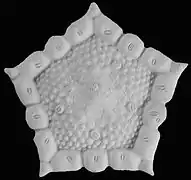 Akelbaster novaecaledoniae
Akelbaster novaecaledoniae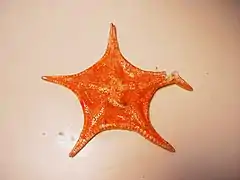 Anthenoides piercei
Anthenoides piercei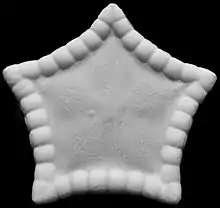
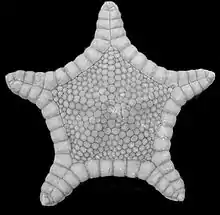 Astroceramus eldredgei
Astroceramus eldredgei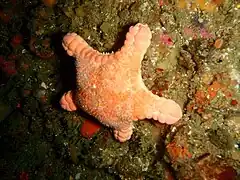
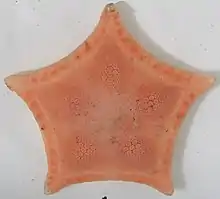 Ceramaster granularis
Ceramaster granularis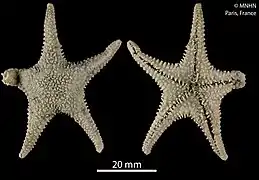 Chitonaster johannae
Chitonaster johannae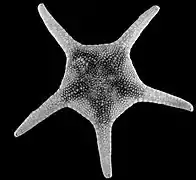 Circeaster sandrae
Circeaster sandrae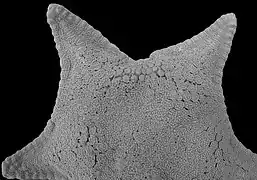 Cladaster analogus
Cladaster analogus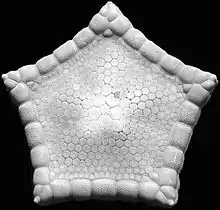 Eknomiaster beccae
Eknomiaster beccae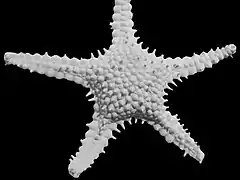 Eratosaster jennae
Eratosaster jennae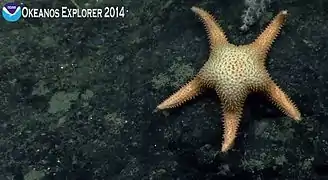 Evoplosoma sp.
Evoplosoma sp.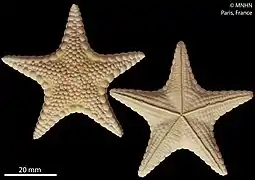
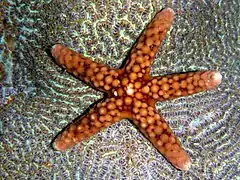 Ferdina flavescens
Ferdina flavescens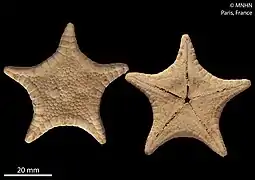 Kanakaster solidus
Kanakaster solidus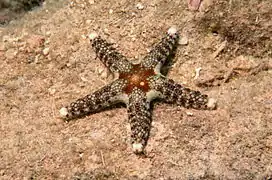
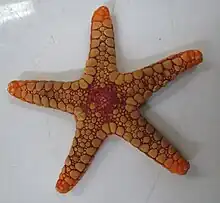 Paraferdina plakos
Paraferdina plakos.jpg.webp)
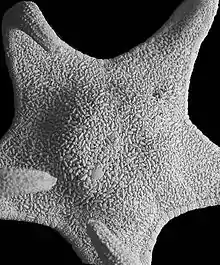 Gilbertaster caribaea
Gilbertaster caribaea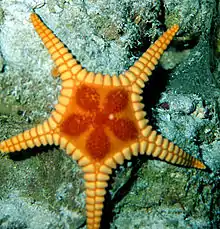 Glyphodiscus magnificus
Glyphodiscus magnificus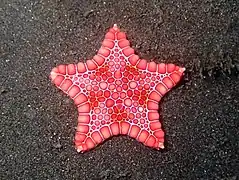 Goniaster tessellatus
Goniaster tessellatus
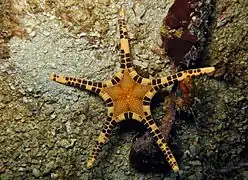
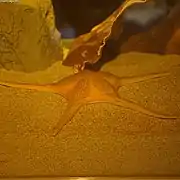 `Mariaster giganteus
`Mariaster giganteus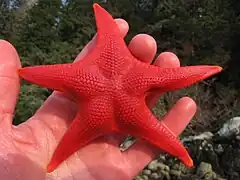
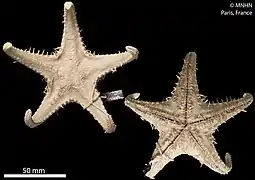 Milteliphaster woodmasoni
Milteliphaster woodmasoni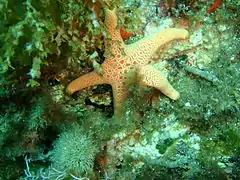 Nectria macrobrachia
Nectria macrobrachia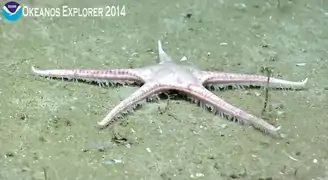 Nymphaster arenatus
Nymphaster arenatus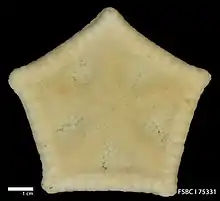 Peltaster placenta
Peltaster placenta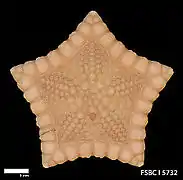

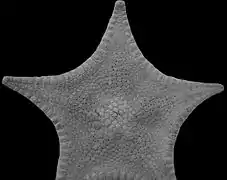 Pillsburiaster calvus
Pillsburiaster calvus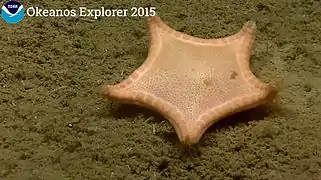 Plinthaster dentatus
Plinthaster dentatus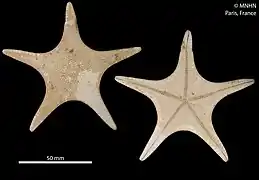 Pseudoceramaster regularis
Pseudoceramaster regularis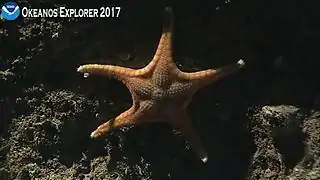 Rosaster sp.
Rosaster sp.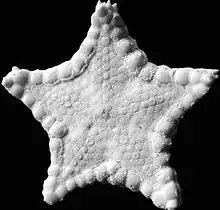
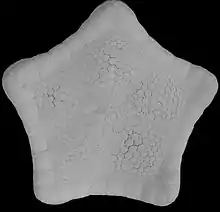 Sphaeriodiscus mirabilis
Sphaeriodiscus mirabilis.jpg.webp) Stellaster childreni
Stellaster childreni_01.jpg.webp) Stellasteropsis fouadi
Stellasteropsis fouadi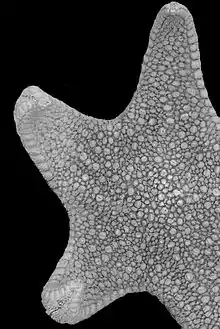
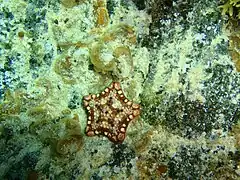
Extinct genera
.jpg.webp)

Lists of genera containing extinct species according to fossilworks.[8]
- Bugarachaster Breton 1992
- Buterminaster Blake and Zinsmeister 1988
- Caletaster Breton 1978
- Capellia Blake and Reid 1998
- Cenomanaster Wright 1951
- Chomataster Spencer 1913
- Codellaster Blake and Kues 2002
- Comptonia Gray 1840
- Comptoniaster Breton 1983
- Cottreauaster Wright 1951
- Crateraster Spencer 1913
- Cymbaster Breton and Néraudeau 2008
- Fayoumaster Roman and Strougo 1987
- Fomalhautia Blake and Reid 1998
- Forbesiaster de Loriol 1909
- Fredaster Breton and Néraudeau 2008
- Galbaster Villier et al. 2004
- Haccourtaster Jagt 2000
- Hessaster Gale 2011
- Huroeaster Valette 1915
- Leptogonium Pomel 1885
- Marocaster Blake and Reboul 2011
- Mastaster Mercier 1935
- Metopaster Sladen 1893
- Miopentagonaster Mercier 1935
- Nehalemia Blake 1973
- Noviaster Valette 1929
- Ocalaster Blake and Portell 2009
- Ophryaster Spencer 1913
- Oyenaster Blake and Portell 2009
- Pachyaster de Loriol 1909
- Parametopaster Breton 1992
- Pentetagonaster d'Orbigny 1850
- Pulcinellaster Breton 1992
- Recurvaster Brünnich-Nielsen 1943
- Skiaster Blake and Jagt 2005
- Spenceraster Lambert 1914
- Sucia Blake 1973
- Talecaster Breton 1992
- Teichaster Spencer 1913
- Tomidaster Sladen 1891
- Tylasteria Valette 1929
References
- ↑ "Family Goniasteridae". Marine Species Identification Portal.
- ↑ "Family Goniasteridae". nzetc.victoria.ac.nz.
- ↑ Mah, Christopher L. (2015-03-05). "New species, corallivory, in situ video observations, and overview of the Goniasteridae (Valvatida, Asteroidea) in the Hawaiian region". Zootaxa. 3926 (2): 211–228. doi:10.11646/zootaxa.3926.2.3. ISSN 1175-5334. PMID 25781779.
- ↑ Clark, A. M. An index of names of recent Asteroidea Part 2: Valvatida. Echinoderm Studies 4 (1993)
- ↑ Christopher Mah (23 April 2013). "How many starfish species are there ? Where do they Live ? How long have they been around ? Five Points about Sea Star Diversity". The Echinoblog.
- ↑ Christopher Mah, "Overview of the Ferdina-like Goniasteridae (Echinodermata: Asteroidea) including a new subfamily, three new genera and fourteen new species", Zootaxa, vol. 4271, 2017.
- ↑ Christopher Mah (2014), Goniasteridae Forbes, 1841, In: Mah, C.L. (2014) World Asteroidea database, accessed through World Register of Marine Species
- ↑ "Fossilworks: Goniasteridae". fossilworks.org. Retrieved 2019-04-06.
![]() Media related to Goniasteridae at Wikimedia Commons
Media related to Goniasteridae at Wikimedia Commons
